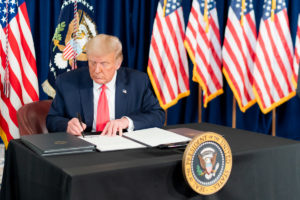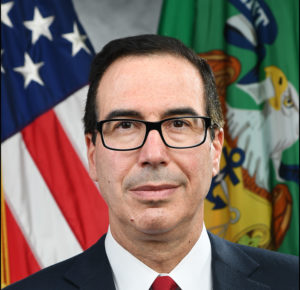
Questions arise for businesses, employees following Trump payroll tax memo
By onAnnouncements | Business Practices | Education | Legal | Market Trends
Republican President Donald Trump on Saturday directed Treasury Secretary Steven Mnuchin to defer payroll taxes between Sept. 1 and Dec. 31 and explore forgiving them entirely.
“(W)hat we’re talking about is deferring the payroll tax for a period of months until the end of the year,” Trump said Friday, according to a transcript provided by the White House. “And I can extend it at a certain period. Hopefully, I will be here to do the job. We’re going to do the job; we’ve been doing the job like nobody could. Nobody would, actually. And so, we’re going to have the payroll tax go until the end of the year, and it’ll be retroactive to July 1st. So we’re going to go back to July 1st, and it’ll go to the end of the year — payroll tax. At the end of the year, it may be extended.”
The memorandum issued Saturday would apply to the Social Security and Medicare taxes assessed on workers making less than $4,000 pre-tax bi-weekly. (Which works out to $104,000 annually.)
Trump wrote that “American workers have been particularly hard hit” by the COVID-19 coronavirus pandemic.
“While the Department of the Treasury has already undertaken historic efforts to alleviate the hardships of our citizens, it is clear that further temporary relief is necessary to support working Americans during these challenging times,” he wrote. “To that end, today I am directing the Secretary of the Treasury to use his authority to defer certain payroll tax obligations with respect to the American workers most in need. This modest, targeted action will put money directly in the pockets of American workers and generate additional incentives for work and employment, right when the money is needed most.”
The deferred amounts won’t face “penalties, interest, additional amount, or addition to the tax,” Trump wrote.
Or perhaps the employee won’t ever have to pay the tax at all. “The Secretary of the Treasury shall explore avenues, including legislation, to eliminate the obligation to pay the taxes deferred pursuant to the implementation of this memorandum,” Trump wrote.
That’s what’s on paper. How the new memo will work in practice is unclear.
American Institute of Certified Public Accountants taxation Vice President Edward Karl said Monday his team has begun compiling a list of potential questions — a list that had “grown exponentially today.” (Obviously, nothing in this article is intended as financial advice; consult your own qualified experts before taking any action.)
The executive memorandum commands Mnuchin to “issue guidance to implement this memorandum.” Based on our conversation with Karl, employers and employees might not get their answers until then.
“You could not implement this without guidance,” Karl said.
Karl said for now, employers should “pause,” focus instead on “the sustainability of the business” and let others focus on obtaining answers. Then, everyone can “regroup,” he said.
CPAs and payroll providers could be good resources for small business owners to lean on as the process evolves, according to Karl. (In fact, he said he had a call scheduled later Monday with some of the largest payroll companies.)
Karl also shared some key questions for small businesses to consider:
- Is the deferral mandatory or optional? Does a business have to participate? What if an employee doesn’t want to defer, preferring to continue withholding payroll taxes instead of postponing them and having to pay up in January?
- What if the employee leaves the business for a different job?
- What if the employer’s company fails in these “very distressed economic times?”
- “So what happens in January? … How do you pay this back?”
- How would the deferral be captured on a W-2?
- Would the employer collect the entire deferred amount at once or spread it over multiple paychecks?
Senate Minority Leader Chuck Schumer, D-N.Y., on Aug. 10 also raised the possibility of businesses not wanting to defer the taxes.
“The president did not ‘cancel’ payroll taxes and this will actually hurt businesses, workers … because most employers will continue to withhold the payroll tax so they and their employees won’t be hit with a huge tax bill in December when it expires,” Schumer said in a statement.
Asked about the turnaround time for providing guidance when such tax changes arise, Karl said both the IRS and Treasury Department are “very good at assessing what guidance is needed,” though “it’s not always easy” to disseminate it all.
Karl described some potential formats for the guidance. Sometimes, Treasury and the IRS will release it in “very informal ways,” he said. It could take the form of FAQs. Sometimes, “they get out the clear stuff first” and continue to hash out more difficult elements.
Karl noted that “not a lot of time” existed to deliver the guidance before the Sept. 1 deferral start date mentioned in the memorandum. However, he also pointed out that an executive request offers more latitude than a statutory date.
Mnuchin expressed support for the payroll tax memo Saturday but didn’t discuss how he would implement it.
“I am pleased that President Trump has taken action to ensure that economic relief continues to be provided for America’s workers, families and businesses,” Mnuchin said regarding that document and other Saturday decrees. “These Executive Orders build upon our ongoing implementation of the CARES Act, which is delivering meaningful results for the American people.
“President Trump is fully committed to making sure that hardworking Americans and businesses continue to have the resources they need as our country safely reopens.”
More information:
“Memorandum on Deferring Payroll Tax Obligations in Light of the Ongoing COVID-19 Disaster”
White House, Aug. 8, 2020
White House transcript of Aug. 7, 2020, Trump remarks and press conference
White House, Aug. 8, 2020
Images:
Republican President Donald Trump signs an executive order related to student loan relief, one of four documents related to the COVID-19 pandemic approved Aug. 8, 2020. The last of these deferred payroll taxes between Sept. 1 and Dec. 31, 2020. (Shealah Craighead/White House)
Treasury Secretary Steven Mnuchin. (Provided by Treasury Department)

